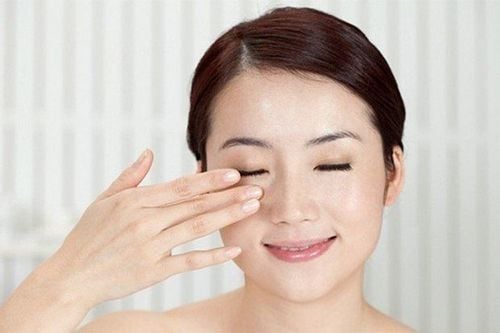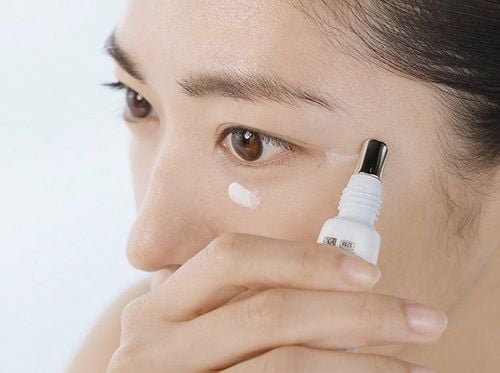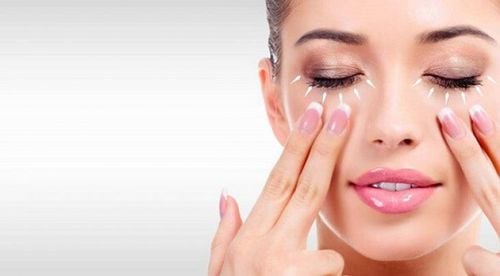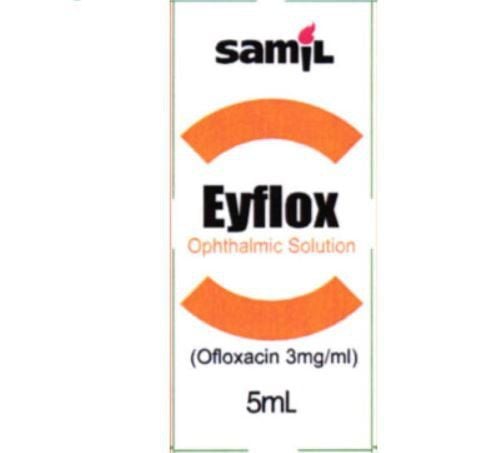This is an automatically translated article.
If you're worried about premature aging, start by taking care of the skin around your eyes. The skin in this area is very delicate, so it is often the first place to show signs of aging. These include problems such as wrinkles, sagging, and dark circles under the eyes. To keep this area healthy, consider using care products like an eye serum or an eye cream. Depending on the formulation, eye cream ingredients can work to plump and hydrate the skin when treating common skin problems.1. How to apply eye cream properly?
Applying eye cream from a young age can have many benefits. But as with all skin care products, it's important to apply eye cream correctly. Not only will this help protect the skin around your eyes, but it will also ensure your skin absorbs the full benefits of the lotion.To get the most out of your eye cream, follow these steps to apply it properly:
Use your ring finger. It's your weakest finger, so it should be gentle on the skin. Take a pea-sized amount of the product. Gently dab small dots under the eyes, starting at the innermost corner and moving outwards. Avoid applying the cream too close to your lower lashes. Gently pat the product to absorb into the skin. Avoid pulling or rubbing the skin. Wait 2 minutes for the cream to fully absorb. Finally, you can apply other skin care products or your makeup. Try not to use a lot of eye cream. Otherwise, the cream may enter the eyes and cause irritation. You also shouldn't apply eye cream to your eyelids unless the instructions say it's safe to do so.
In general, you should apply eye cream before your moisturizer and sunscreen. Eye cream is usually light, so it is usually applied first, whereas heavier products should be applied last.
2. Skin care tips for the eye area
In addition to applying eye cream properly, follow these tips for eye skin care:Massage by gently massaging the skin around the eyes to improve circulation and reduce puffiness. Remove eye makeup: Avoid going to bed with makeup still on the eye area. Use a gentle and safe makeup remover specifically for the area around the eyes. Wear sunglasses: Choose glasses that block ultraviolet A and B rays (UVA and UVB). This will reduce the risk of eye wrinkles and skin cancer in situ. Wear a wide-brimmed hat: To further protect your eyes and eyelids, wear a hat. Note that the brim of the hat must be at least 6-7 cm wide.

Ngoài việc thoa kem dưỡng mắt, hãy mát xa vùng mắt nhẹ nhàng.
3. When and how often should you apply eye cream?
You can apply eye cream at different times of the day. However, you will need different eye creams for different times of the day.In the morning: Use a light texture because it will help you feel more comfortable when applying makeup. Look for products with SPF to protect your skin from the sun and reduce the risk of wrinkles forming. In the evening: When you apply your eye cream at night, the ingredients can be absorbed into the skin overnight. You should choose a richer cream with moisturizing ingredients and without SPF. To enjoy all the benefits above, use an eye cream at both times. You will need two different formulations, so keep this in mind when purchasing the product. The ideal time to apply eye cream depends on your preferences and goals. But regardless of the time, you should only repeat the application of eye cream once every 12 hours. You don't have to reapply the same product day and night.
4. The ingredients that make up the best eye cream
With so many varieties on the market, choosing the best eye cream can be overwhelming.An eye cream should contain ingredients that are good for the skin such as:
Coenzyme Q10 (CoQ10). CoQ10 protects the skin from sun damage and reduces the risk of wrinkles. Peptides: Peptides support collagen production, so they are ideal for delicate skin areas such as the skin around the eyes and fine lines. Ceramides: Ceramides have a role in improving the strength and moisture content of the skin. Niacinamide: This antioxidant has a brightening and moisturizing effect. It can also reduce excess sebum. Hyaluronic Acid: Hyaluronic acid attracts water, helping to hydrate the skin. It also improves skin elasticity. Alpha hydroxy acids (AHAs): AHAs like lactic acid, glycolic acid, and mandelic acid can treat hyperpigmented skin. Vitamin C: Vitamin C, an antioxidant, has sun protection and skin lightening properties. Vitamin E: Vitamin E helps to moisturize and soothe the skin. Vitamin K: This vitamin helps improve swelling, circulation and reduce dark circles. Caffeine: Caffeine reduces puffiness and dark circles under the eyes. Retinoids: Retinoids can reduce the appearance of wrinkles, but they should only be used at night. They can also cause skin irritation, so only use retinoid products designed for people with small eyes. Ferulic Acid: Ferulic acid protects the skin from environmental damage. Chamomile: For an anti-inflammatory effect, use an eye cream with chamomile. SPF: This is key to preventing sun damage and wrinkles around your eyes. Some ingredients work best for certain skin types only. To make it easier to choose a skin cream, users should carefully consider the ingredients to choose the right product for their skin type.

Hãy lựa chọn kem dưỡng mắt phù hợp với làn da của bạn.
Oily skin If you have oily skin, you can look for ingredients that are similar to acne-prone skin. Look for an oil-free or hypoallergenic eye cream. Choose an eye cream that contains ingredients: Chamomile, green tea extract, witch hazel, AHAs, retinoids.
Dry skin Eye moisturizers with a thicker texture will be best suited for dry skin. Look for an eye cream that contains the following ingredients: Ceramides, niacinamide, hyaluronic acid, glycerin, and vitamin E.
The skin around the eyes, including the eyelids, is very delicate. In fact, it's the thinnest skin on your body. This makes it prone to many problems:
Being dry. Excited. Resistant to sun damage. Destroyed due to environmental factors. There are signs of premature aging. The skin in this area will become thinner with age. That's because our skin loses its elasticity and strength over time. To protect the skin around your eyes, be mindful of the products you use around the eye area. You should use skin care and makeup formulas specifically for the skin around your eyes. Never apply products intended for other parts of the body to the skin around the eyes as they can be too sensitive. Use caution when using any product on the skin around the eyes. Be gentle and avoid getting too close to the eyes as this can cause irritation and discomfort.
You can apply eye cream morning, evening or both. If you use in the morning, choose a formula that contains SPF to prevent sun damage and wrinkle formation. At night, use one with a thick and moisturizing texture.
Please follow the website: Vinmec.com regularly to update many other useful information.
Please dial HOTLINE for more information or register for an appointment HERE. Download MyVinmec app to make appointments faster and to manage your bookings easily.













